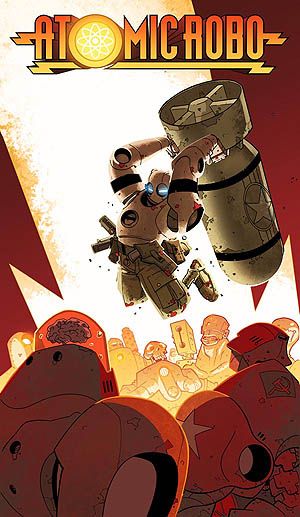
As of yesterday, I finally have a complete set of Transmetropolitan. When the final volumes arrived, and I got home to pick them up, I immediately stretched out on the couch to finish reading the series. Then, last night, I started reading it again. I’m planning on reading through every trade paperback in sequence once a year going forward.
Why, you might ask?
Well, for one thing, it’s absolutely brilliant.
For those of you who don’t know, Transmetropolitan is a story set somewhere in our future. It’s an interesting future. It isn’t a good one, like Star Trek, nor is it a terribly bad one, like so many dystopias. Sure, there’s an underclass and poverty and police brutality and incredibly corrupt politicians, but we have that now. There movements for human rights and outraged citizenry and sex on street corners and incredibly inane television, but we have that now. What we don’t have is the technology to rearrange matter on an atomic level or the ability to download ourselves into nanotech cloud-bodies.
We also don’t have Spider Jerusalem.
Maybe that’s a good thing. Spider’s kind of like if Hunter S. Thompson came back from the dead and came back incredibly fucking pissed. Short, angry, blunt, manic, and unpredictable, Spider is described as an “outlaw journalist”. He barely tolerates rules regarding decorum or rights to privacy, as such things can get in the way of the pursuit of Truth. His column is absolutely scathing, completely undiluted, and takes no prisoners. His writing and his character make for an extremely compelling read.
On a deeper level, though, I have to say that I understand Spider Jerusalem pretty well.
Part of that is because Spider needs to write. It isn’t a profession or a hobby, it is a compulsion. Seriously, his necessity for expressing himself and pursuing Truth in the written word is only slightly an exaggeration of that of many writers. And he does with that need what all successful writers must do: he writes. Even when it’s hard, especially when it’s hard, he puts himself in front of his machinery and he produces words. His two-fisted editor knows how to get the work out of him, with four little magical words: “Where’s my fucking column?”
In that regard, I envy Spider, and I see a level of production I wish to attain, which is the second reason why I want to read Transmetropolitan every year. Inspiration.
Not just for writing in general. I also get inspired to keep an eye on the Truth. Spider comes across as a very angry, bitter, cynical man. He pursues religious bigots and political powerhouses alike, with boundless zeal and merciless brutality. He’d be the first to break down why the tenets upon which your entire life has been built are absolute bullshit, and why you’d do the world a favor by jumping into an industrial wood-chipper right goddamn now. But he’d only do that if you’re an asshole. Spider, under all of the bluster and bravado, is a good person. He wants what’s best. He wants what’s right. He wants the Truth. And he will do what it takes to make sure the Truth wins out, no matter what.
While I envy and admire Spider in several ways, though, I won’t be shaving my head or getting an excessive amount of tattoos any time soon.
A very dear and close friend of mine describes Parks & Recreation‘s Ron Swanson as “my favorite person I wish nobody would try and emulate.” I see Spider in a similar way. I don’t want to be Spider Jerusalem, nor would I want anybody close to me to try and be him, either. I’d be glad for his presence, sure, but I can’t see him interacting with people around me on a daily basis in a way that’s conducive for staying out of jail or keeping my genitals intact.
I’m going to read Transmetropolitan every year because it’s brilliant, it’s inspiring, and it keeps the spirit of Spider Jerusalem fresh in my head.
People talk of having angels or devils on their shoulders. I think, sometimes, Spider perches on mine. He’s definitely on my shelf. Kind of like Bob from The Dresden Files, only instead of inhabiting a skull, Spider just ambles around my bookshelf. I see him being about six inches tall (which he hates). He’s smoking up a storm (not that I can smell it, his cigarettes are tiny). He’s glaring at me. And when I write something that isn’t to the best of my ability, he starts spitting nails and curse words and implications regarding my mother’s virtue at me. Spider’s never one to mince words. And I know he’s angry because he gives a damn.
The anger isn’t the point. What you do with that anger is the point. Do you sit back and complain at the television? Or do you wing your bottle at the damned talking box, grab your bowel disruptor and filthy assistants, hit the streets and do something about it?
Spider taught me that.
And right now he’s telling me we both need some goddamn coffee.



